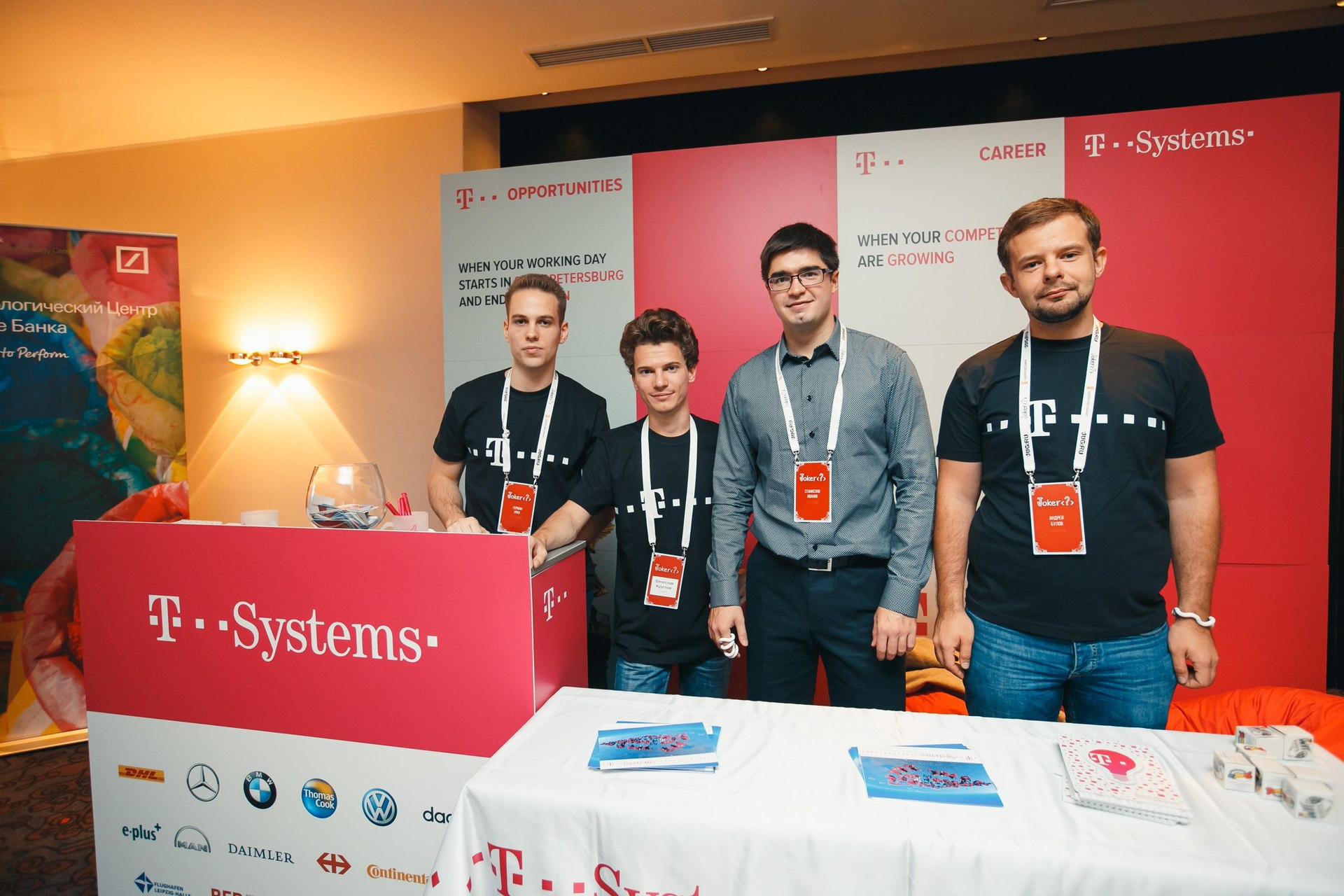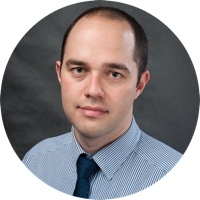“Recently launched an online sales system for BMW”: T-Systems on the role of Java and conferences in their operations
How do you understand how actively the IT company uses Java? One of the signs: if the company sponsors a Java conference and sends a speaker there, then it’s active. Therefore, in anticipation of Joker 2016, we decided to ask our sponsors about Java and participation in the conference. The first post is about T-Systems .

We asked several employees of the company: some about their personal experience in Java development at T-Systems, others about the company as a whole. Our interlocutors are:
 - What gives you participation in Joker?
- What gives you participation in Joker?
- We solve two problems. On the one hand, it is an exchange of experience between our employees and employees of other companies. Community for any specialist is a very important point in terms of new ideas and a fresh look. On the other hand, we advertise ourselves as an employer in the professional community, and for a large company with more than one hundred projects this is fundamentally important for further success.
- What role does Java play in your company, and why in these cases is preference given to it?
- This is the main development language for a large number of projects. Projects are mostly distributed, and part of the team is located in another division of T-Systems - for example, in Brazil, Slovakia or Germany. I got Java preference, as it is a powerful tool for creating complex corporate multi-module systems.
- What interesting Java projects are there now?
- We have a lot of them. One of our flagship projects is for Swiss Railways. We are developing from scratch a unified system of sales management of tickets for all types of transport in Switzerland, uniting more than 200 transport companies. A large number of projects are being done for our parent company Deutsche Telekom - for example, the business portal GK-Portale, a portal for the company's customers.
We recently launched a project for BMW - an online sales system. This is a new project that we will do from scratch in the Russian office, in close cooperation with BMW Germany.
 - You are interested in both Java EE and Spring - and which of these do you often work with at T-Systems?
- You are interested in both Java EE and Spring - and which of these do you often work with at T-Systems?
- We have many projects on both platforms. I worked at approximately the same time on both technologies. Specifically, I am currently working in a Java EE project, and I really like the standardization that this platform offers. The same code runs on multiple Java EE 7 servers without any additional configuration. In my opinion, this is one of the critical benefits of Java EE. Spring, for its part, is often an “incubator” of great ideas, which are subsequently standardized in Java EE.
- What do you think about the future of Java EE and the “stagnation” that Oracle now promises to fight? How much will your output from the promised EE 8 and EE 9 affect your work at T-Systems?
- Yes, lately there have been many discussions and even panic moods. I personally believe that EE in the near future will definitely not die, and, moreover, it will develop well. Too much business is tied to it. It should be borne in mind that, in addition to Oracle, there is a strong community around this technology, which is very active. At JavaOne we were shown a new roadmap. I would like not to be late with new deadlines. Regarding the impact of new versions of Java EE on our projects, I think it will only be positive. In my current project, we have very actively introduced many of the innovations of EE 7, I am sure it will be the same with EE 8 in new projects.
- You are organizing the jPrime conference in Bulgaria . How do the experiences of participating in someone else's conference and organizing your own relate?
- Yes, it turns out that I have the opportunity to see “what is a technological conference” with the eyes of the speaker, the eyes of the organizer, and the eyes of the viewer. This is certainly great, because in this way we can make our conference even better for all parties. The jPrime conference, although very young, was already able to become the largest in the region. In our group of organizers of 5 people are all programmers, we do not have professional event organizers. Therefore, we had to learn a lot from scratch ourselves, and participating in other conferences helped us a lot.
- In addition to this, you are also the leader of the Bulgarian Java User Group - can you tell us about the activities of the community?
- The task of our community is quite simple: we want to know Java as well as possible. We even set ourselves a more ambitious task - to directly participate in the development of this language and the entire platform. We do workshops on innovations that either just appeared (for example, MVC 1.0), or are still under development and research (for example, the Valhalla project). For this, in addition to communicating with each other, we always strive to invite to us the largest professionals in this field, including from abroad. Moreover, we try to do it regularly. And conferences and meetings are a great way to fulfill our ideas.
- What will you talk about at Joker?
- My report is called “JBatch, or not the biggest data”. I’ll talk about the relatively new JSR-352, whose task is to standardize and optimize approaches to batche (or batch) data processing in Java. This language has established itself in the enterprise, where the tasks of batch processing are quite common, and surprisingly, there were no standardized solutions until recently.
 - In T-Systems, you are a Java developer and team lead - and which team are you leading, what are you working on?
- In T-Systems, you are a Java developer and team lead - and which team are you leading, what are you working on?
- Our project is called SBB , we are developing software for the sale of tickets for public transport in Switzerland. The team is about 40 people, and we are doing all the development in Russia. The customer provides only requirements. In fact, we are a product team.
- Last year's Joker, you had a report on working with various databases using Hibernate - and which databases do T-Systems work with?
- Very much depends on the project. There are many projects, they have their own requirements. The most common is, of course, Oracle. Meets MySQL. Some projects use MariaDB, someone NoSQL.
- Recently appeared the material "5 reasons to use JPA / Hibernate"- And what, in your experience, is the main reason for their use?
- I also read this article, most of all there I liked the item "increasing development productivity." Indeed, Hibernate allows you to write the necessary code very quickly, without worrying about any routine requests.
- The opposite text appeared, “Hibernate ruined my career” about how he made the project worse and not better - did you come across this in T-Systems?
- In those projects where I worked, this was not, at us Hibernate was useful. Yes, there were many problems, and their solution took some time, but overall it brought relief. But I have no doubt that there are tasks in which this is not necessary. This is a fairly serious framework that carries a lot of functionality, and somewhere it is not required.
- Do you have experience teaching young people both at Joker University Day and in the format of a Java school - and do you also form yourself during such training? Did the report reveal that you yourself learned something?
- Oh sure. In the process of preparing and searching for material, there were very interesting points that could not be found from work. Including those that can later be used in the work.
And in the "non-technical" plan, too, study. In preparation for Joker, training from the JUG.ru Group turned out to be very useful: it helped to structure knowledge on how to conduct a report and rebuild it. This ultimately helped a lot, including in the Java school.
 - The company uses different methods of communication - how is the conference different for you from others?
- The company uses different methods of communication - how is the conference different for you from others?
Remote communication involves a lot of formalism - standard wording about the advantages of the company, achievements and customers. Live communication at the event allows visitors to receive much more interesting information. You can ask questions about specific projects in which teams are recruited, and talk with their representatives about the details.
- Joker is held in St. Petersburg - is this just one of the cities for T-Systems, or is the venue important?
The St. Petersburg office is the central office of our company in Russia, most of the team is here. Java projects are mainly done here: in St. Petersburg, for example, we develop internal systems for our parent company Deutsche Telekom or projects for customers from the automotive industry - a very large project BMW Online Sales Master (OSM). This is the third project for BMW, launched in our software development center in 2016.
Therefore, as a rule, we participate in person at conferences held in St. Petersburg. But, of course, this does not limit our speakers - they speak at relevant conferences regardless of the city of their holding. And we invite employees from different cities, and we are ready to help with the move.
- What response does the company usually receive after the reports of your speakers?
Usually, after the speakers' speeches, the flow of visitors to the booth, wishing to find out details about our company, projects, greatly increases. And the matter is rather not in the topic of the report itself, but in the general positive impression that is formed about the company due to the presentation. This is especially noticeable after the reports of the leaders of Java and Test schools at events for those who are just starting their careers: they learn about learning opportunities “from the inside”, and not from brochures, and this is of interest. On the other hand, the report of an experienced specialist allows you to discuss a complex design problem and share the solution found.
- Thanks for the answers, we will wait in October for Dmitry’s new report. In the meantime, you can recall the reports of T-Systems speakers from the previous Joker: Dmitry about Nashorn and Vyacheslav about Hibernate.

We asked several employees of the company: some about their personal experience in Java development at T-Systems, others about the company as a whole. Our interlocutors are:
- Kirill Chernin - HR business partner
- Dmitry Alexandrov - leading expert programmer (speaker Joker)
- Vyacheslav Kruglov - Java-developer, team lead (speaker Joker)
- Maria Zernova - specialist in internal communications
Kirill Chernin
 - What gives you participation in Joker?
- What gives you participation in Joker? - We solve two problems. On the one hand, it is an exchange of experience between our employees and employees of other companies. Community for any specialist is a very important point in terms of new ideas and a fresh look. On the other hand, we advertise ourselves as an employer in the professional community, and for a large company with more than one hundred projects this is fundamentally important for further success.
- What role does Java play in your company, and why in these cases is preference given to it?
- This is the main development language for a large number of projects. Projects are mostly distributed, and part of the team is located in another division of T-Systems - for example, in Brazil, Slovakia or Germany. I got Java preference, as it is a powerful tool for creating complex corporate multi-module systems.
- What interesting Java projects are there now?
- We have a lot of them. One of our flagship projects is for Swiss Railways. We are developing from scratch a unified system of sales management of tickets for all types of transport in Switzerland, uniting more than 200 transport companies. A large number of projects are being done for our parent company Deutsche Telekom - for example, the business portal GK-Portale, a portal for the company's customers.
We recently launched a project for BMW - an online sales system. This is a new project that we will do from scratch in the Russian office, in close cooperation with BMW Germany.
Dmitry Alexandrov
 - You are interested in both Java EE and Spring - and which of these do you often work with at T-Systems?
- You are interested in both Java EE and Spring - and which of these do you often work with at T-Systems? - We have many projects on both platforms. I worked at approximately the same time on both technologies. Specifically, I am currently working in a Java EE project, and I really like the standardization that this platform offers. The same code runs on multiple Java EE 7 servers without any additional configuration. In my opinion, this is one of the critical benefits of Java EE. Spring, for its part, is often an “incubator” of great ideas, which are subsequently standardized in Java EE.
- What do you think about the future of Java EE and the “stagnation” that Oracle now promises to fight? How much will your output from the promised EE 8 and EE 9 affect your work at T-Systems?
- Yes, lately there have been many discussions and even panic moods. I personally believe that EE in the near future will definitely not die, and, moreover, it will develop well. Too much business is tied to it. It should be borne in mind that, in addition to Oracle, there is a strong community around this technology, which is very active. At JavaOne we were shown a new roadmap. I would like not to be late with new deadlines. Regarding the impact of new versions of Java EE on our projects, I think it will only be positive. In my current project, we have very actively introduced many of the innovations of EE 7, I am sure it will be the same with EE 8 in new projects.
- You are organizing the jPrime conference in Bulgaria . How do the experiences of participating in someone else's conference and organizing your own relate?
- Yes, it turns out that I have the opportunity to see “what is a technological conference” with the eyes of the speaker, the eyes of the organizer, and the eyes of the viewer. This is certainly great, because in this way we can make our conference even better for all parties. The jPrime conference, although very young, was already able to become the largest in the region. In our group of organizers of 5 people are all programmers, we do not have professional event organizers. Therefore, we had to learn a lot from scratch ourselves, and participating in other conferences helped us a lot.
- In addition to this, you are also the leader of the Bulgarian Java User Group - can you tell us about the activities of the community?
- The task of our community is quite simple: we want to know Java as well as possible. We even set ourselves a more ambitious task - to directly participate in the development of this language and the entire platform. We do workshops on innovations that either just appeared (for example, MVC 1.0), or are still under development and research (for example, the Valhalla project). For this, in addition to communicating with each other, we always strive to invite to us the largest professionals in this field, including from abroad. Moreover, we try to do it regularly. And conferences and meetings are a great way to fulfill our ideas.
- What will you talk about at Joker?
- My report is called “JBatch, or not the biggest data”. I’ll talk about the relatively new JSR-352, whose task is to standardize and optimize approaches to batche (or batch) data processing in Java. This language has established itself in the enterprise, where the tasks of batch processing are quite common, and surprisingly, there were no standardized solutions until recently.
Vyacheslav Kruglov
 - In T-Systems, you are a Java developer and team lead - and which team are you leading, what are you working on?
- In T-Systems, you are a Java developer and team lead - and which team are you leading, what are you working on? - Our project is called SBB , we are developing software for the sale of tickets for public transport in Switzerland. The team is about 40 people, and we are doing all the development in Russia. The customer provides only requirements. In fact, we are a product team.
- Last year's Joker, you had a report on working with various databases using Hibernate - and which databases do T-Systems work with?
- Very much depends on the project. There are many projects, they have their own requirements. The most common is, of course, Oracle. Meets MySQL. Some projects use MariaDB, someone NoSQL.
- Recently appeared the material "5 reasons to use JPA / Hibernate"- And what, in your experience, is the main reason for their use?
- I also read this article, most of all there I liked the item "increasing development productivity." Indeed, Hibernate allows you to write the necessary code very quickly, without worrying about any routine requests.
- The opposite text appeared, “Hibernate ruined my career” about how he made the project worse and not better - did you come across this in T-Systems?
- In those projects where I worked, this was not, at us Hibernate was useful. Yes, there were many problems, and their solution took some time, but overall it brought relief. But I have no doubt that there are tasks in which this is not necessary. This is a fairly serious framework that carries a lot of functionality, and somewhere it is not required.
- Do you have experience teaching young people both at Joker University Day and in the format of a Java school - and do you also form yourself during such training? Did the report reveal that you yourself learned something?
- Oh sure. In the process of preparing and searching for material, there were very interesting points that could not be found from work. Including those that can later be used in the work.
And in the "non-technical" plan, too, study. In preparation for Joker, training from the JUG.ru Group turned out to be very useful: it helped to structure knowledge on how to conduct a report and rebuild it. This ultimately helped a lot, including in the Java school.
Maria Zernova
 - The company uses different methods of communication - how is the conference different for you from others?
- The company uses different methods of communication - how is the conference different for you from others? Remote communication involves a lot of formalism - standard wording about the advantages of the company, achievements and customers. Live communication at the event allows visitors to receive much more interesting information. You can ask questions about specific projects in which teams are recruited, and talk with their representatives about the details.
- Joker is held in St. Petersburg - is this just one of the cities for T-Systems, or is the venue important?
The St. Petersburg office is the central office of our company in Russia, most of the team is here. Java projects are mainly done here: in St. Petersburg, for example, we develop internal systems for our parent company Deutsche Telekom or projects for customers from the automotive industry - a very large project BMW Online Sales Master (OSM). This is the third project for BMW, launched in our software development center in 2016.
Therefore, as a rule, we participate in person at conferences held in St. Petersburg. But, of course, this does not limit our speakers - they speak at relevant conferences regardless of the city of their holding. And we invite employees from different cities, and we are ready to help with the move.
- What response does the company usually receive after the reports of your speakers?
Usually, after the speakers' speeches, the flow of visitors to the booth, wishing to find out details about our company, projects, greatly increases. And the matter is rather not in the topic of the report itself, but in the general positive impression that is formed about the company due to the presentation. This is especially noticeable after the reports of the leaders of Java and Test schools at events for those who are just starting their careers: they learn about learning opportunities “from the inside”, and not from brochures, and this is of interest. On the other hand, the report of an experienced specialist allows you to discuss a complex design problem and share the solution found.
- Thanks for the answers, we will wait in October for Dmitry’s new report. In the meantime, you can recall the reports of T-Systems speakers from the previous Joker: Dmitry about Nashorn and Vyacheslav about Hibernate.
